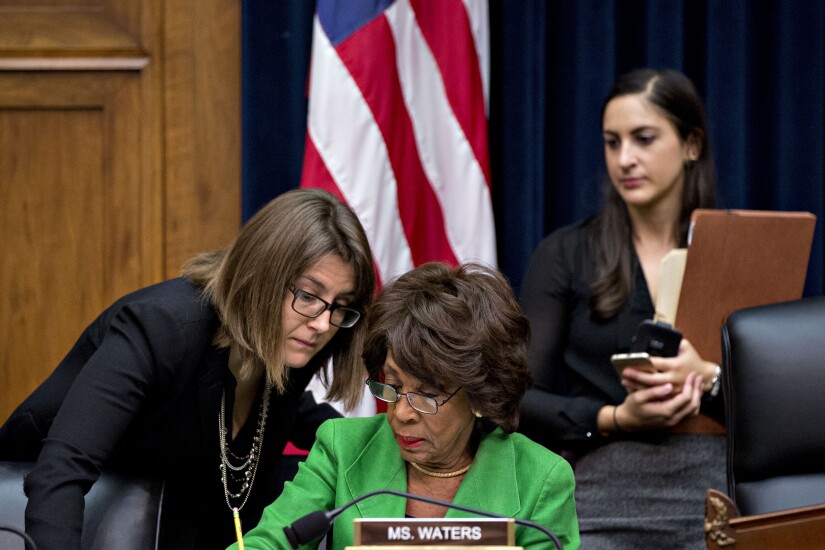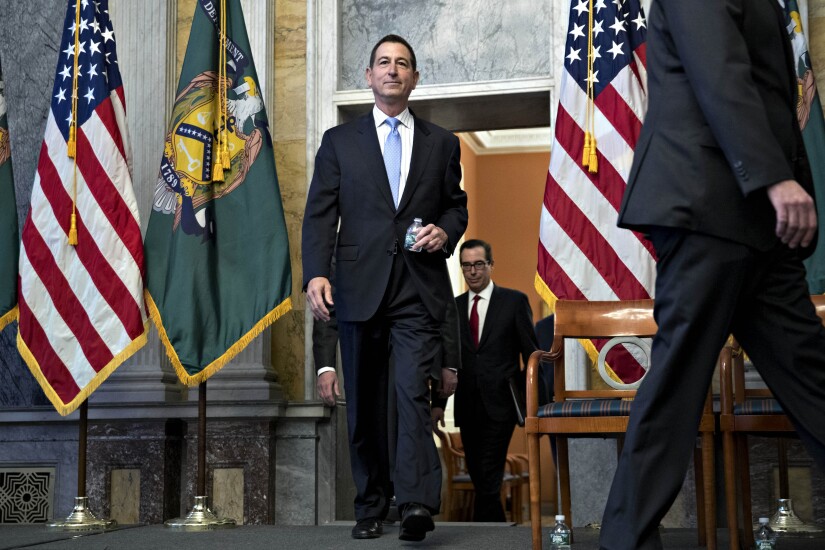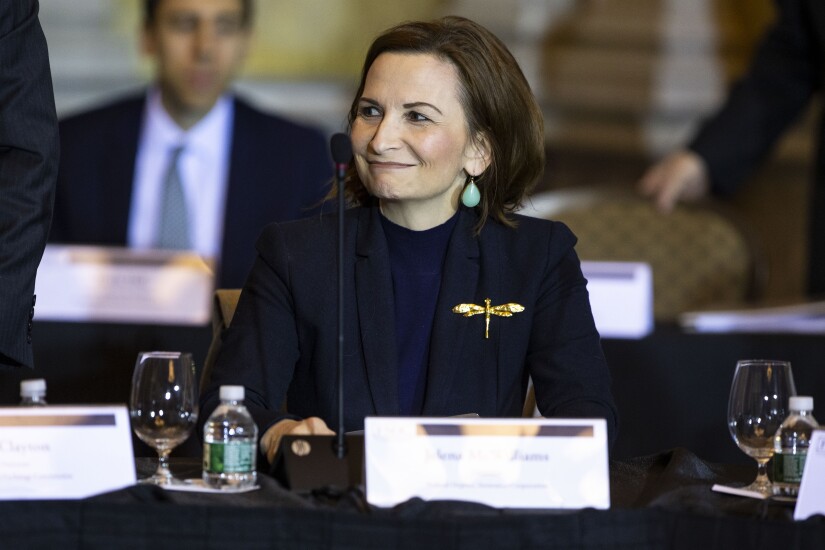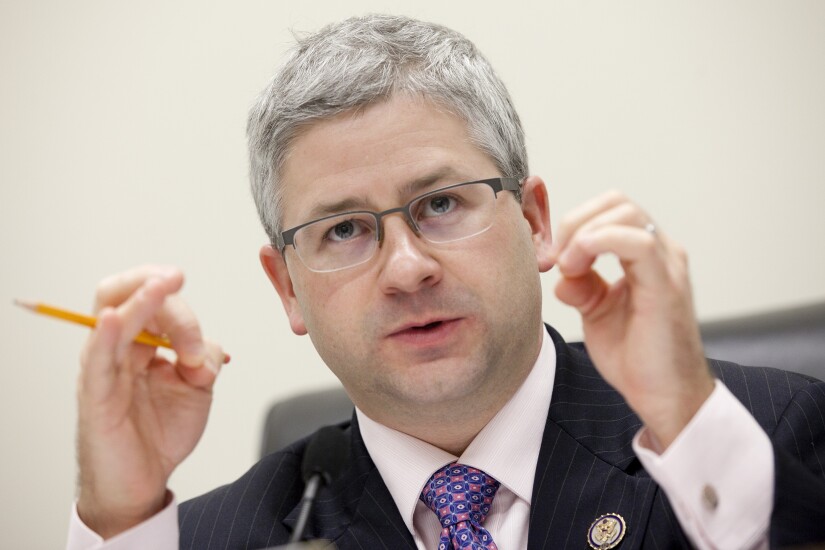These heads of regulatory agencies and key members of Congress will determine the course of banking rules in the new year. Here are 11 that banks should keep their eye on:

Kathy Kraninger
She signaled early in her tenure that she wouldn’t follow all of Mulvaney’s initiatives to the letter,
“We must do our work with an open mind and without presumptions of guilt, and to always carefully weigh the costs and benefits to consumers of our enforcement activities and regulatory rulemakings,” she

Rep. Maxine Waters
Waters, one of her caucus’ harshest critics of President Trump, could use her new leadership position to conduct investigations of financial firms associated with the Trump family’s business dealings, including Deutsche Bank and Citigroup. Under her watch, the committee could also intensify oversight of firms like Wells Fargo and Equifax that have been embattled in scandals over opening fake accounts and a massive data breach, respectively.
But some expect Waters to take a
After the November midterms, Waters released a memo indicating that she is “committed” to strong oversight of the Trump administration, including the embattled firms connected to his family, but that she will also prioritize financial inclusion and consumer protection.
More recently, she warned Mick Mulvaney — the former acting director of the CFPB who attempted to scale back the agency’s enforcement practices — that she could

Sen. Mike Crapo
Expected to continue his role atop the committee, Crapo will likely resume focus on how the law, officially known as S 2155, is being implemented. He held hearings in 2018 with regulators to discuss implementation, and pushed the Federal Reserve Board to move quickly with a proposal to determine how to regulate banks with assets of $100 billion to $250 billion.
Crapo also controls the Senate agenda on reforming the current housing finance system. Lawmakers of both parties agree the current system dominated by the government-sponsored enterprises Fannie Mae and Freddie Mac needs to be overhauled, yet a legislative solution has eluded Congress for years.

Joseph Otting
Otting succeeds FHFA Director Mel Watt, an Obama-era appointee whose term expired on Sunday. Otting's new role moves the Trump White House
Yet Otting will also have his hands full at the Office of the Comptroller of the Currency. He’s

Jelena McWilliams
In 2019, she will the hold key for FDIC plans to reform its policy on brokered-deposit restrictions for banks that face capital challenges. She will also be heavily involved in the implementation of the regulatory relief law passed by Congress last year, which included a new simplified capital ratio for community banks. The FDIC and the other agencies proposed the “Community Bank Leverage Ratio” in 2018, but have yet to finalize it.
McWilliams will also need to set the FDIC’s future course on industrial loan companies.
New ILC charters have been a rarity since controversial bids by large retailers before the crisis sparked opposition by community banks and other groups, but McWilliams has sounded open to approving firms. In December, the payment processing firm Square
Both McWilliams and Randal Quarles, the Fed’s vice chairman of supervision, face a decision on whether to join with the Office of the Comptroller of the Currency on a formal proposal for modernizing the agencies’ policy on enforcing the Community Reinvestment Act.

Randal Quarles
Unlike most of the other Trump-appointed regulators, Quarles has had a full year to carve out an agenda, having joined the Fed in October 2017. But his views on many issues remain unknown. Observers are watching, for example, how Quarles and the Fed will tackle reform of the Community Reinvestment Act during the year. Quarles has said the regulators can coalesce around a proposal, but what that entails is not yet clear.
More broadly, Quarles, a former top Treasury Department official in the George W. Bush administration, has not been the deregulatory champion that big banks may have hoped for and consumer groups feared. Instead, he's pushed for tailoring bank regulations, focusing mostly on helping community banks and midsize institutions. Though Democrats have criticized the Fed for its approach, many bankers and Republicans feel it is moving too cautiously.
Other key items to watch this year will be proposed new capital requirements for the biggest institutions, which isn't likely to be implemented until 2020 at the earliest, and changes to the Volcker Rule. The industry rejected regulators' first stab at simplifying the ban on proprietary trading, and the agencies are likely to take another look at the issue.

Mark Calabria
The most pressing question in 2019 about Calabria, a former Senate Banking Committee staffer, is whether he has an
Calabria has the advantage of a Republican majority, but he may have to temper his views somewhat to assure moderate senators that he would not take administrative steps as FHFA director that could upend the housing market. For example, in a 2016 op-ed for American Banker, Calabria advocated for the FHFA to use existing authority to
If he is confirmed, Calabria will be the primary overseer of Fannie and Freddie’s conservatorships, and would have some authority to reform the two government-sponsored enterprises in the absence of any legislative solution for the housing finance system. And if Congress were to reform the GSEs during his term, Calabria’s FHFA would likely lead the implementation.

Sen. Sherrod Brown
In the previous Congress, Brown had attempted to negotiate with Crapo on a reg relief package, but after those talks ended, a group of more moderate Democrats dealt directly with the Banking Committee chairman — resulting in S 2155, a bill that Brown that opposed.
Brown was an outspoken critic of Mulvaney’s leadership at the CFPB. In November, he released a report titled “Pushing the Envelope,” which blasted Mulvaney’s decisions to drop lawsuits against payday lenders, suspend routine examinations under the Military Lending Act violations, and hire political appointees to run the agency’s day-to-day operations, among other things. And the Democratic senator strongly opposed Kraninger’s nomination to serve as the permanent director of the CFPB.
Along with Waters and Sen. Elizabeth Warren, D-Mass., he is expected to push back against weakening regulatory restrictions, particularly when he gets a chance to question Kraninger and other regulators appointed by the Trump administration.

Rep. Patrick McHenry
When McHenry announced his bid for ranking member, he touted his record of working with Republicans and Democrats on the committee. But said his “eyes are wide open” to the goals of the new Democratic House majority and he is “fully prepared to fight back” against any efforts to reverse reg relief mandates and to “use the committee as the launch pad for endless, partisan investigations.”
But if McHenry is able to negotiate with Waters, the committee could see some legislative movement on financial technology issues. He has previously supported efforts to give fintech companies flexibility to go to market sooner with their products, as well as “regulatory sandboxes” for fintech firms.

Sen. Elizabeth Warren
The Massachusetts Democrat staunchly opposed S 2155, and was openly critical of members of her own party who voted for the reg relief package. Warren is a lead voice among Democratic progressives in the Senate, a cadre that has rejected changes to the post-financial crisis regulatory regime.
In the previous Congress, her legislative proposals included bills to limit the revolving door between corporations and the government; to apply the Community Reinvestment Act to more financial institutions besides banks, including credit unions; and to allow businesses to skirt the federal ban on marijuana in states where the substance is legal, in order to give them access to banking.
While Republicans will still hold control of the Senate and the White House in 2019, and most of Warren’s proposals won’t meet the chamber’s 60-vote threshold, her legislative priorities could draw more attention as the 2020 presidential election begins to heat up. Her likely presidential bid could elevate financial regulatory issues on the national stage.

New House Democrats
It remains to be seen whether new progressive House Democrats such as Alexandria Ocasio-Cortez of New York and Katie Porter of California simply give the left a louder voice in the House, or will actually help steer the majority's policy agenda further to the left.
The new Democratic entrants appear interested in having roles on financial services policy. After her election victory, Ocasio-Cortez expressed interest





